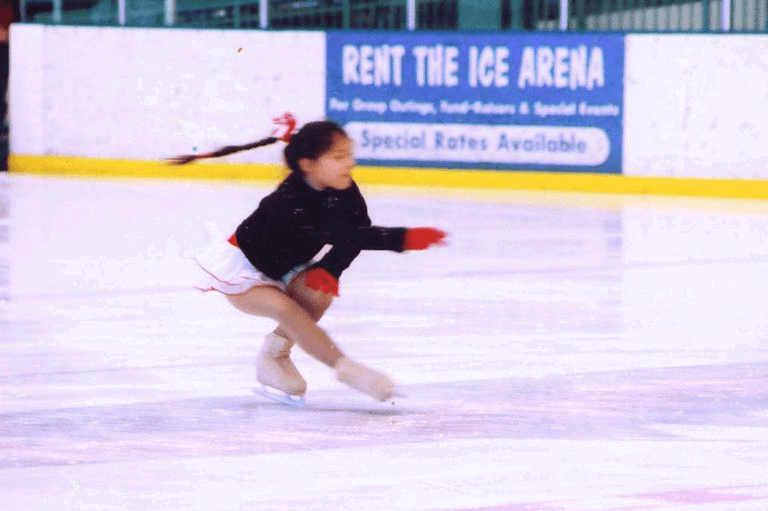Your guide to figure skating spins

Figure skating is undoubtedly one of the most aesthetically pleasing sports to watch. Not only are the costumes incredible, but the routines come equipped with mesmerizing moves like jumps, twirls, and spins. As a beginner or spectator, you’re probably left wondering how in the world skaters can produce such beautiful moves while gliding across the ice.
Before you get dizzy watching videos of figure skaters spinning so effortlessly, check out the following guide for a breakdown of the various types of figure skating spins. This will get you on the right path to further appreciating the sport and learning to identify everything from the basic scratch spin to the illusion spin.
Figure Skating Spins
There are a variety of spins that a skater can incorporate into their routine. While spins may seem less exciting than some of the more complex jumps, they add balance into a routine that helps make it more appealing to watch. And while spins don’t get as many points as jumps, they are just as valuable to the technical score as they are to the stylistic aspect of a performance. Spins are categorized by the body position of the skater and range from easy to difficult. Sometimes they even include jumps and lifts.
A spin can be classified as either forward or backward—not in relation to the direction the skater is spinning, but rather the foot they are turning on. No matter which foot a skater chooses to execute a spin on, he or she will be spinning on the ball of the foot, just behind the toe pick. The goal of a successful spin is to rotate in one spot while in a specific body position, such as upright, sitting, or camel.
When a skater performs a perfect spin, it can be seen on the ice as a circle traced over and over again in the same spot. If a skater fails to stay in one spot, the skate will create a series of loops in the ice—this is called traveling.
Upright Spins

An upright spin consists of the skater spinning in an upright position, essentially looking as though they’re standing. There are many variations of the upright spin that a skater can integrate into their routine to add variety and innovation.
Here are some different types of upright spins:
- Scratch spin: A scratch spin is an upright spin in which the free leg is crossed in front of the skating leg.
- One-foot spin: This is your basic upright spin. The skater rotates on just one foot.
- Two-foot spin: Another basic upright spin in which the skater rotates on both feet.
- Layback spin: For this upright spin, the head and shoulders are dropped backward, and the skater’s back is arched downward toward the ice.
- Biellmann spin: Named after figure skater Denise Biellmann, this spin involves the skater executing a one-foot spin while holding the other foot extended over and behind the head, forming a teardrop shape with the body.
- “I” spin: The skater performs a one-foot spin while holding their free leg up in front of his or her body, similar to the splits.
- “Y” spin: Similar spin to the “I” spin, but with the free leg held in a vertical split toward the side of the body.
Sit Spins

A sit spin is a spin performed in a squatting position. During this spin, the angle in the knee bend should be less than 90 degrees. Like the upright spin, there are several different variations of the sit spin that can be integrated into a routine.
Check out these common types of sit spins:
- Basic sit spin: The skater has the skating leg bent and the free leg extended forwards, also known as a shoot-the-duck position.
- Back sit spin: For this spin, the skater spins on the leg opposite to the one in which they would normally spin, this is called the back sit spin. When this spin is entered from a jump, it is known as a death drop.
- Broken leg sit spin: Instead of sticking straight out, the skater’s free leg is turned inward at the knee.
- Pancake spin: Considered a higher-level, more difficult spin, the pancake spin requires the free leg to be crossed and propped over the skate leg horizontal to the ice, with the upper body bent over it.
- Cannonball sit spin: Similar to the pancake spin, but with the skater’s arms held down to touch the skating leg, giving the appearance of a cannonball.
Camel Spins

The last and one of the more difficult types of basic figure skating spins is the camel spin. During this type of spin, a skater’s free leg is extended backward with the knee held above hip level.
Types of camel spins include:
- Basic camel spin: The skater’s free leg is extended behind them, parallel to the surface of the ice.
- Layover spin: The torso and free leg are positioned so that they are pointing toward the ceiling, rather than toward the ice.
- Illusion spin: The illusion spin starts out like a basic camel spin. However, rather than remaining in a fixed position throughout the spin, the skater’s body will shift up and down in a rhythmic movement.
Master Your Spins in Custom Figure Skates
The right pair of figure skates will give you the support you need to advance in your skating career. With custom figure skates from Riedell, you’ll never have to worry about whether or not your skates will help or hinder your performance. Our master craftsmen will design and build a fit tailored to the exact specifications and features of your feet. With customizations including color, leather temper, firmness, and more, you’ll be mastering spins in your dream figure skates in no time! And don’t hesitate to reach out if you have any questions
